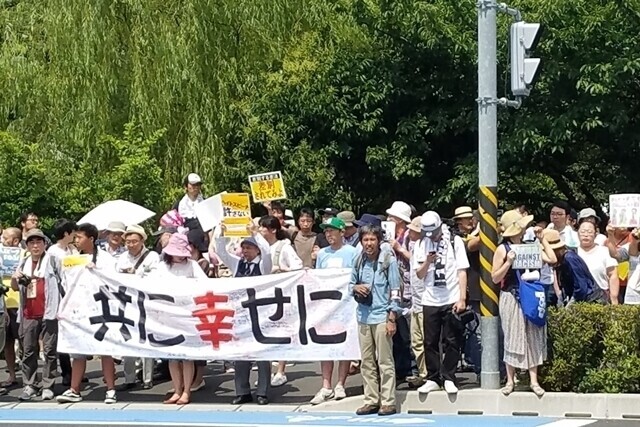hankyoreh
Links to other country sites 다른 나라 사이트 링크
COVID-19 pandemic fuels hate speech in Japan

Hate speech has been increasing in Japan amid the novel coronavirus pandemic, the Tokyo Shimbun newspaper reported on June 5.
In particular, the newspaper reported on a spate of telephone and email messages to Saitama Korean Elementary and Middle School in Saitama -- a city in Saitama Prefecture that is part of the Greater Tokyo region -- telling the readers to “go back to your country if you don’t like it here.”
The telephone and email messages can be traced to an incident in March involving a Korean kindergarten in Saitama being excluded from the distribution of face masks. Saitama Korean Elementary and Middle School encompasses a local elementary and middle school and kindergarten. Amid a severe shortage of face masks in Japan at the time, Saitama established plans to distribute 240,000 reserve marks to employees working at daycare centers, kindergartens, after-school classes, and senior citizen facilities in the city. But the Korean kindergarten was not included as a distribution recipient, as the facility is not supervised by the city.
After the kindergarten and members of the public protested the decision as “discriminatory,” Saitama announced that it would be providing masks for the kindergarten as well. The principle of Saitama Korean Elementary and Middle School told the newspaper that some members of the Japanese public were under the mistaken impression that “children at Korean schools were receiving [masks] that even Japanese people weren’t getting.”
Koreans and Chinese become targets for hate speechThe Chinatown in Yokohama, a city in Kanagawa Prefecture, has also been a focus of hate speech in connection with the virus. In March, letters stating that Chinese people should “leave Japan now” were sent to at least six stores in the Chinatown area, the newspaper reported, explaining that the message appeared to have to do with the first cases of coronavirus infections having been found in the Chinese city of Wuhan. With the Chinatown located just 3km from the dock where the Diamond Princess cruise ship has been at anchor following an infection cluster at the time, sales at stores in the area have plummeted by 70%.
Around 2013, hate speech emerged as a societal issue in Japan, with frequent instances of it occurring on streets in downtown locations. Communities where many Zainichi Koreans reside, such as the city of Kawasaki in Kanagawa Prefecture, have been a major focus. In 2016, the Japanese government enacted a Hate Speech Act -- but with the law not including provisions for prohibition or punishment, hate speech has yet to be eradicated. Last year, Kawasaki, a major setting for hate speech, became the first local government in Japan to enact an ordinance allowing for its punishment. This was a step forward, but with the actual system requiring the city to submit a criminal complaint following a review by one of its committees, actual punishment remains difficult.
By Cho Ki-weon, Tokyo correspondent
Please direct comments or questions to [english@hani.co.kr]

Editorial・opinion
![[Editorial] Penalties for airing allegations against Korea’s first lady endanger free press [Editorial] Penalties for airing allegations against Korea’s first lady endanger free press](https://flexible.img.hani.co.kr/flexible/normal/500/300/imgdb/original/2024/0502/1817146398095106.jpg) [Editorial] Penalties for airing allegations against Korea’s first lady endanger free press
[Editorial] Penalties for airing allegations against Korea’s first lady endanger free press![[Editorial] Yoon must halt procurement of SM-3 interceptor missiles [Editorial] Yoon must halt procurement of SM-3 interceptor missiles](https://flexible.img.hani.co.kr/flexible/normal/500/300/imgdb/child/2024/0501/17145495551605_1717145495195344.jpg) [Editorial] Yoon must halt procurement of SM-3 interceptor missiles
[Editorial] Yoon must halt procurement of SM-3 interceptor missiles- [Guest essay] Maybe Korea’s rapid population decline is an opportunity, not a crisis
- [Column] Can Yoon steer diplomacy with Russia, China back on track?
- [Column] Season 2 of special prosecutor probe may be coming to Korea soon
- [Column] Park Geun-hye déjà vu in Yoon Suk-yeol
- [Editorial] New weight of N. Korea’s nuclear threats makes dialogue all the more urgent
- [Guest essay] The real reason Korea’s new right wants to dub Rhee a founding father
- [Column] ‘Choson’: Is it time we start referring to N. Korea in its own terms?
- [Editorial] Japan’s rewriting of history with Korea has gone too far
Most viewed articles
- 160% of young Koreans see no need to have kids after marriage
- 2Presidential office warns of veto in response to opposition passing special counsel probe act
- 3Months and months of overdue wages are pushing migrant workers in Korea into debt
- 4Hybe-Ador dispute shines light on pervasive issues behind K-pop’s tidy facade
- 5Japan says it’s not pressuring Naver to sell Line, but Korean insiders say otherwise
- 6[Reporter’s notebook] In Min’s world, she’s the artist — and NewJeans is her art
- 7[Editorial] Penalties for airing allegations against Korea’s first lady endanger free press
- 8Inside the law for a special counsel probe over a Korean Marine’s death
- 9OECD upgrades Korea’s growth forecast from 2.2% to 2.6%
- 10[Exclusive] Hanshin University deported 22 Uzbeks in manner that felt like abduction, students say